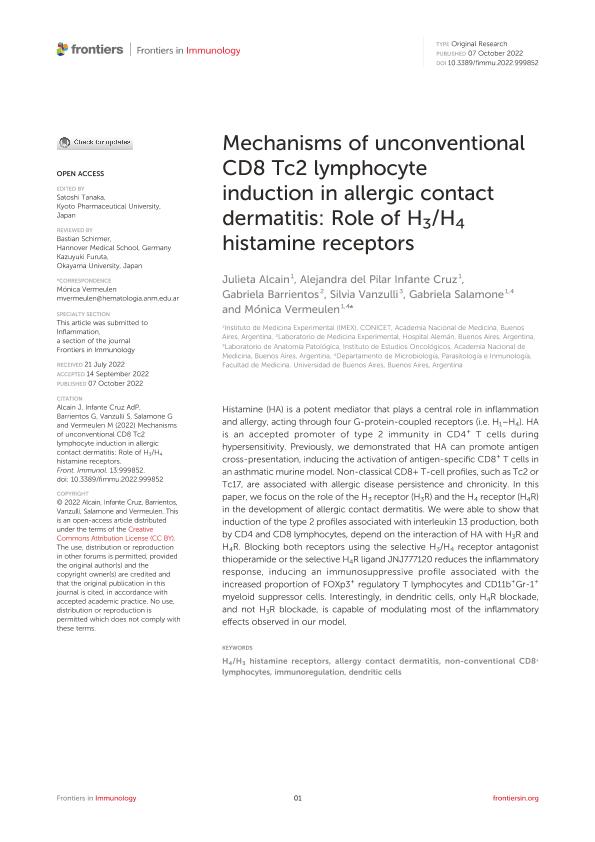Mostrar el registro sencillo del ítem
dc.contributor.author
Alcain, Julieta María

dc.contributor.author
Infante Crúz, Alejandra del Pilar

dc.contributor.author
Barrientos, Gabriela Laura

dc.contributor.author
Vanzulli, Silvia

dc.contributor.author
Salamone, Gabriela Veronica

dc.contributor.author
Vermeulen, Elba Monica

dc.date.available
2023-08-02T13:29:52Z
dc.date.issued
2022-10
dc.identifier.citation
Alcain, Julieta María; Infante Crúz, Alejandra del Pilar; Barrientos, Gabriela Laura; Vanzulli, Silvia; Salamone, Gabriela Veronica; et al.; Mechanisms of unconventional CD8 Tc2 lymphocyte induction in allergic contact dermatitis: Role of H3/H4 histamine receptors; Frontiers Media; Frontiers in Immunology; 13; 10-2022; 1-13
dc.identifier.issn
1664-3224
dc.identifier.uri
http://hdl.handle.net/11336/206492
dc.description.abstract
Histamine (HA) is a potent mediator that plays a central role in inflammation and allergy, acting through four G-protein-coupled receptors (i.e. H1–H4). HA is an accepted promoter of type 2 immunity in CD4+ T cells during hypersensitivity. Previously, we demonstrated that HA can promote antigen cross-presentation, inducing the activation of antigen-specific CD8+ T cells in an asthmatic murine model. Non-classical CD8+ T-cell profiles, such as Tc2 or Tc17, are associated with allergic disease persistence and chronicity. In this paper, we focus on the role of the H3 receptor (H3R) and the H4 receptor (H4R) in the development of allergic contact dermatitis. We were able to show that induction of the type 2 profiles associated with interleukin 13 production, both by CD4 and CD8 lymphocytes, depend on the interaction of HA with H3R and H4R. Blocking both receptors using the selective H3/H4 receptor antagonist thioperamide or the selective H4R ligand JNJ777120 reduces the inflammatory response, inducing an immunosuppressive profile associated with the increased proportion of FOXp3+ regulatory T lymphocytes and CD11b+Gr-1+ myeloid suppressor cells. Interestingly, in dendritic cells, only H4R blockade, and not H3R blockade, is capable of modulating most of the inflammatory effects observed in our model.
dc.format
application/pdf
dc.language.iso
eng
dc.publisher
Frontiers Media

dc.rights
info:eu-repo/semantics/openAccess
dc.rights.uri
https://creativecommons.org/licenses/by-nc-sa/2.5/ar/
dc.subject
ALLERGY CONTACT DERMATITIS
dc.subject
DENDRITIC CELLS
dc.subject
H4/H3 HISTAMINE RECEPTORS
dc.subject
IMMUNOREGULATION
dc.subject
NON-CONVENTIONAL CD8+ LYMPHOCYTES
dc.subject.classification
Inmunología

dc.subject.classification
Medicina Básica

dc.subject.classification
CIENCIAS MÉDICAS Y DE LA SALUD

dc.title
Mechanisms of unconventional CD8 Tc2 lymphocyte induction in allergic contact dermatitis: Role of H3/H4 histamine receptors
dc.type
info:eu-repo/semantics/article
dc.type
info:ar-repo/semantics/artículo
dc.type
info:eu-repo/semantics/publishedVersion
dc.date.updated
2023-08-02T10:49:15Z
dc.journal.volume
13
dc.journal.pagination
1-13
dc.journal.pais
Suiza

dc.description.fil
Fil: Alcain, Julieta María. Consejo Nacional de Investigaciones Científicas y Técnicas. Instituto de Medicina Experimental. Academia Nacional de Medicina de Buenos Aires. Instituto de Medicina Experimental; Argentina
dc.description.fil
Fil: Infante Crúz, Alejandra del Pilar. Consejo Nacional de Investigaciones Científicas y Técnicas. Instituto de Medicina Experimental. Academia Nacional de Medicina de Buenos Aires. Instituto de Medicina Experimental; Argentina
dc.description.fil
Fil: Barrientos, Gabriela Laura. Hospital Alemán; Argentina. Consejo Nacional de Investigaciones Científicas y Técnicas; Argentina
dc.description.fil
Fil: Vanzulli, Silvia. Academia Nacional de Medicina de Buenos Aires; Argentina
dc.description.fil
Fil: Salamone, Gabriela Veronica. Consejo Nacional de Investigaciones Científicas y Técnicas. Instituto de Medicina Experimental. Academia Nacional de Medicina de Buenos Aires. Instituto de Medicina Experimental; Argentina
dc.description.fil
Fil: Vermeulen, Elba Monica. Consejo Nacional de Investigaciones Científicas y Técnicas. Instituto de Medicina Experimental. Academia Nacional de Medicina de Buenos Aires. Instituto de Medicina Experimental; Argentina
dc.journal.title
Frontiers in Immunology
dc.relation.alternativeid
info:eu-repo/semantics/altIdentifier/doi/http://dx.doi.org/10.3389/fimmu.2022.999852
Archivos asociados
